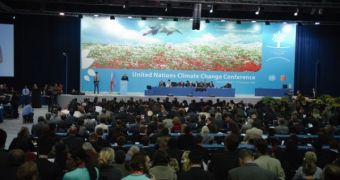The December 1-12 UN Climate Change Conference, hosted by the city of Poznan, in Poland, adds to the very problem it's trying to fix, global warming. Estimates of the UN Framework Convention on Climate Change (UNFCCC) say that more than 13,000 tonnes of carbon will be released into the atmosphere during the talks, an enormous amount, which is to be offset by Poland alone, once the meetings end next Friday.
These figures are based on the participation of 8,000 people to the venue, whereas 10,657 had already signed up by Sunday. The UNFCCC says that Poland "plans to offset the total emissions resulting from the conference once a final calculation has been made." Typically, that involves tighter regulations on the industry for a period of time, or the import of advanced, cleaner technology from rich nations.
Reforestation is also an option for offsetting the carbon emissions, but it's a long-term one, as it takes a few years for the vegetation to grow and start trapping carbon from the air. Plus, wildfires and illegal tree cutting can render this type of efforts useless over very short periods of time.
The main goal of this conference is to achieve an international consensus on the measures to be employed by countries worldwide in the fight against global warming and climate change. Representatives from 187 nations met in Poznan on the 1st of December, and the head of the UN Climate Change Secretariat, Yvo de Boer, says that the first round of negotiations was "promising."
The upbeat mood is mostly caused by the US president-elect, Barack Obama, who vowed to engage America in an international agreement on controlling fossil fuel and deforestation, as the Bush administration failed to include the country in the 1997 Kyoto Protocol, when Congress didn't ratify the treaty. Even China sat down at the table, and its representatives said that they were very eager to discuss possible solutions with developed countries.

 14 DAY TRIAL //
14 DAY TRIAL //